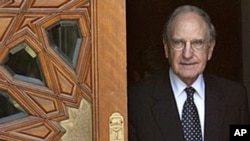A group of Arab Americans meeting at the Al Hewar Center in suburban Washington consider the U.S. role in Middle East peace the cornerstone of Arab-American relations.
For them President Barack Obama began his first year in office in 2009 with a clear commitment to ending the Israeli-Palestinian conflict and support for a Palestinian state.
"The cause of peace in the Middle East is important to us and to our national interest," Obama said. "It is important to me personally."
Israeli-Palestinian Talks
But despite the restart of U.S.-mediated peace talks between the Israelis and Palestinians, those talks have stalled over Israel's refusal to agree to a new freeze on Jewish settlement construction in the West Bank.
And for that, members of the group say Obama is partly to blame.
"He promised that Israel has to stop its settlements, and Israel stands in defiance of the American administration," says Omar Khalida, a businessman.
College student Ahmed Aisawah adds, "As an Arab, I do not perceive a Middle East peace process as long as the U.S. continues its total support for Israel."
Iraq
However, when it comes to Iraq, President Obama's strategy won praise from some of the group's members.
"The Iraqi people before the change did not have any hope," says Diaa Saadawi, a book store manager. "Now at least they have hope."
But some were concerned about Iraq's future, even though Obama has ended the U.S. combat mission there. People such as restaurant owner Mohamed Abu Abed.
"I do not think that there will be a new Iraq for a long time because it is completely destroyed," he said.
Egypt
The fate of Egyptian democracy is another topic of concern at Al Hewar Center.
The Obama administration criticized the lack of transparency in parliamentary elections this past November, but student Ahmed al-Sawah still questions the U.S. commitment to democracy across the Middle East.
"Who is currently in power is passing it onto his son," says al-Sawah. "And if that suits U.S. strategic interests, Washington would not mind power inheritance in the Arab world."
Al-Sawah referrs to widespread speculation that President Hosni Mubarak is preparing his son Gamal to succeed him.
Stephen Seche, the former U.S. Ambassador to Yemen, concedes that U.S. strategic interests can play a role in America's policies toward the Middle East. But he says the will of the people should not be ignored.
"We have to be able to make it clear that our commitment will extend to the daily issues that trouble the people of the region and make a very strong and concerted effort to find a resolution to those problems as well," says Seche.
Anti-Muslim sentiment
A Florida Christian minister's orginal plan to burn hundreds of copies of the Quran and other protests against a proposed Islamic cultural center in New York near where Islamist terrorists attacked in 2001, also concerned the participants in the discussion with Seche.
"That controversy that erupted made some Muslims in the Arab world feel that America is anti-Muslim or anti-Islam," says Khaled Saffouri, an Arab-American activist.
But despite their concerns about anti-Muslim rhetoric in the United States, and U.S. policies toward the Middle East, many Arab Americans at the discussion say they hope the coming year will bring better U.S. relations with Arabs and Muslims around the world.




